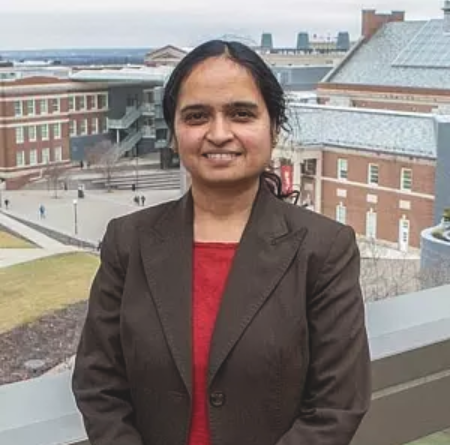The Vulgarity of Caste: Dalits, Sexuality, and Humanity in Modern India
A talk by Shailaja Paik, Charles P. Taft Distinguished Professor of History and Affiliate in Women’s, Gender, and Sexuality Studies and Asian Studies, University of Cincinnati on her new book, The Vulgarity of Caste: Dalits, Sexuality, and Humanity in Modern India (Stanford University Press, 2022), that analyzes the politics of caste, class, gender, sexuality, and popular culture in modern Maharashtra. The book won the American Historical Association’s John F. Richards award for “the most distinguished work of scholarship on South Asia” and the Association of Asian Studies 2024 Ananda Kentish Coomaraswamy Prize.
Panelists
Elora Shehabuddin, Professor of Gender & Women’s Studies and Global Studies and Director, Subir and Malini Chowdhury Center for Bangladesh Studies and Joanna Korey, a graduate student in the Department of History will serve as discussants. Event moderated by Aarti Sethi, Assistant Professor of Anthropology, UC Berkeley.
About the Book
This book offers the first social and intellectual history of Dalit performance of Tamasha—a popular form of public, secular, traveling theater in Maharashtra—and places Dalit Tamasha women who represented the desire and disgust of the patriarchal society at the heart of modernization in twentieth century India. Drawing on ethnographies, films, and untapped archival materials, Shailaja Paik illuminates how Tamasha was produced and shaped through conflicts over caste, gender, sexuality, and culture. Dalit performers, activists, and leaders negotiated the violence and stigma in Tamasha as they struggled to claim manuski (human dignity) and transform themselves from ashlil (vulgar) to assli (authentic) and manus (human beings). Building on and departing from the Ambedkar-centered historiography and movement-focused approach of Dalit studies, Paik examines the ordinary and everydayness in Dalit lives. Ultimately, she demonstrates how the choices that communities make about culture speak to much larger questions about inclusion, inequality, and structures of violence of caste within Indian society, and opens up new approaches for the transformative potential of Dalit politics and the global history of gender, sexuality, and the human.
Speaker Bio
Shailaja Paik is Charles P. Taft Distinguished Professor of History and Affiliate in Women’s, Gender, and Sexuality Studies and Asian Studies, University of Cincinnati and the author of Dalit Women’s Education in Modern India: Double Discrimination (London and New York: Routledge, 2014). Paik’s current research is funded by the American Council of Learned Societies Frederick Burkhardt Fellowship, Stanford Humanities Center, and the National Endowment for the Humanities-American Institute of Indian Studies Senior Fellowship. She will be a fellow at the Stanford Humanities Center next year.
Her first book, Dalit Women’s Education in Modern India: Double Discrimination (Routledge, 2014 ), examines the nexus between caste, class, gender, and state pedagogical practices among Dalit (“Untouchable”) women in urban India. Paik’s current research is funded by the American Council of Learned Societies Frederick Burkhardt Fellowship and the National Endowment for the Humanities-American Institute of Indian Studies Senior Fellowship.
Paik is working on several new book projects: Becoming “Vulgar”: Caste Domination and Normative Sexuality in Modern India, Caste and Race in South Asia, and the Cambridge Companion to Dr. B.R. Ambedkar. She has published several articles on a variety of themes, including the politics of naming, Dalit and African American women, Dalit women’s education, and new Dalit womanhood in colonial India, in prestigious international journals. Her research has been funded by Yale University, Emory University, the Ford Foundation, Warwick University, Charles Wallace India Trust, and the Indian Council of Social Sciences and Research, among others. Her scholarship and research interests are concerned with contributing to and furthering the dialogue in human rights, anti-colonial struggles, transnational women’s history, women-of-color feminisms, and particularly on gendering caste, and subaltern history. Paik recently co-organized the “Fifth International Conference on the Unfinished Legacy of Dr. Ambedkar” at the New School, October 2019.
Sponsors
Presented by the Institute for South Asia Studies. Co-sponsored by the Center on Contemporary India, Gender and Women’s Studies, and the Berkeley Center for the Study of Religion.
Admission Information
If you require an accommodation for effective communication (ASL interpreting/CART captioning, alternative media formats, etc.) or information about campus mobility access features in order to fully participate in this event, please contact Puneeta Kala at pkala@berkeley.edu with as much advance notice as possible and at least 7-10 days in advance of the event.

